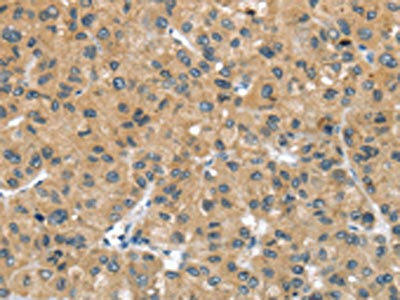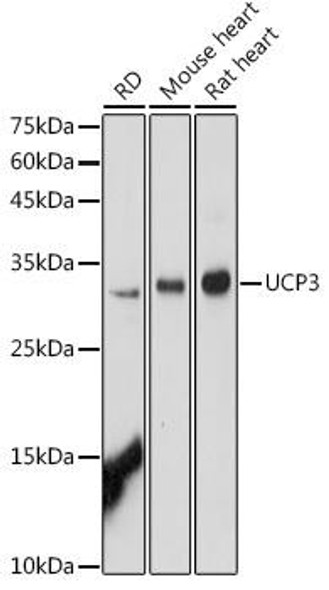Description
UCP3 Antibody (PACO20818)
The UCP3 Polyclonal Antibody (PACO20818) is a specialized tool for researchers studying uncoupling protein 3 (UCP3), a key regulator of energy metabolism and mitochondrial function. This antibody, produced in rabbits, is highly specific and sensitive for detecting UCP3 in human samples, making it ideal for use in Western blot applications.UCP3 is primarily found in skeletal muscle and brown adipose tissue, where it plays a crucial role in dissipating energy as heat. By targeting UCP3, researchers can investigate its involvement in metabolic disorders, obesity, and diabetes, as well as its potential as a therapeutic target for these conditions.
Furthermore, the UCP3 Polyclonal Antibody can be utilized in studies exploring the role of UCP3 in exercise physiology, thermogenesis, and mitochondrial dysfunction. Its reliability and specificity make it an invaluable tool for advancing our understanding of UCP3 biology and its implications for human health.
| Antibody Name: | UCP3 Antibody (PACO20818) |
| Antibody SKU: | PACO20818 |
| Size: | 50ul |
| Host Species: | Rabbit |
| Tested Applications: | ELISA, IHC |
| Recommended Dilutions: | ELISA:1:2000-1:5000, IHC:1:25-1:100 |
| Species Reactivity: | Human, Mouse, Rat |
| Immunogen: | Synthetic peptide of human UCP3 |
| Form: | Liquid |
| Storage Buffer: | -20°C, pH7.4 PBS, 0.05% NaN3, 40% Glycerol |
| Purification Method: | Antigen affinity purification |
| Clonality: | Polyclonal |
| Isotype: | IgG |
| Conjugate: | Non-conjugated |
 | The image on the left is immunohistochemistry of paraffin-embedded Human liver cancer tissue using PACO20818(UCP3 Antibody) at dilution 1/20, on the right is treated with synthetic peptide. (Original magnification: x200). |
| Background: | Mitochondrial uncoupling proteins (UCP) are members of the larger family of mitochondrial anion carrier proteins (MACP). UCPs separate oxidative phosphorylation from ATP synthesis with energy dissipated as heat, also referred to as the mitochondrial proton leak. UCPs facilitate the transfer of anions from the inner to the outer mitochondrial membrane and the return transfer of protons from the outer to the inner mitochondrial membrane. They also reduce the mitochondrial membrane potential in mammalian cells. The different UCPs have tissue-specific expression; this gene is primarily expressed in skeletal muscle. This gene's protein product is postulated to protect mitochondria against lipid-induced oxidative stress. Expression levels of this gene increase when fatty acid, supplies to mitochondria exceed their oxidation capacity and the protein enables the export of fatty acid, from mitochondria. UCPs contain the three solcar protein domains typically found in MACPs. Two splice variants have been found for this gene. |
| Synonyms: | uncoupling protein 3 (mitochondrial, proton carrier) |
| UniProt Protein Function: | UCP3: UCP are mitochondrial transporter proteins that create proton leaks across the inner mitochondrial membrane, thus uncoupling oxidative phosphorylation. As a result, energy is dissipated in the form of heat. May play a role in the modulation of tissue respiratory control. Participates in thermogenesis and energy balance. Defects in UCP3 may be involved in obesity (OBESITY). It is a condition characterized by an increase of body weight beyond the limitation of skeletal and physical requirements, as the result of excessive accumulation of body fat. Belongs to the mitochondrial carrier family. 3 isoforms of the human protein are produced by alternative splicing. |
| UniProt Protein Details: | Protein type:Mitochondrial; Membrane protein, multi-pass; Membrane protein, integral; Transporter Chromosomal Location of Human Ortholog: 11q13.4 Cellular Component: integral to membrane; mitochondrial inner membrane; mitochondrion Molecular Function:oxidative phosphorylation uncoupler activity; protein binding; structural constituent of ribosome; transporter activity Biological Process: aging; cellular metabolic process; cellular response to hormone stimulus; fatty acid metabolic process; lipid metabolic process; mitochondrial transport; proton transport; respiratory gaseous exchange; response to activity; response to cold; response to glucocorticoid stimulus; response to hypoxia; response to insulin stimulus; response to nutrient; response to superoxide; translation Disease: Obesity |
| NCBI Summary: | Mitochondrial uncoupling proteins (UCP) are members of the larger family of mitochondrial anion carrier proteins (MACP). UCPs separate oxidative phosphorylation from ATP synthesis with energy dissipated as heat, also referred to as the mitochondrial proton leak. UCPs facilitate the transfer of anions from the inner to the outer mitochondrial membrane and the return transfer of protons from the outer to the inner mitochondrial membrane. They also reduce the mitochondrial membrane potential in mammalian cells. The different UCPs have tissue-specific expression; this gene is primarily expressed in skeletal muscle. This gene's protein product is postulated to protect mitochondria against lipid-induced oxidative stress. Expression levels of this gene increase when fatty acid supplies to mitochondria exceed their oxidation capacity and the protein enables the export of fatty acids from mitochondria. UCPs contain the three solcar protein domains typically found in MACPs. Two splice variants have been found for this gene.[provided by RefSeq, Nov 2008] |
| UniProt Code: | P55916 |
| NCBI GenInfo Identifier: | 2497983 |
| NCBI Gene ID: | 7352 |
| NCBI Accession: | P55916.1 |
| UniProt Secondary Accession: | P55916,O60475, Q96HL3, |
| UniProt Related Accession: | P55916 |
| Molecular Weight: | |
| NCBI Full Name: | Mitochondrial uncoupling protein 3 |
| NCBI Synonym Full Names: | uncoupling protein 3 (mitochondrial, proton carrier) |
| NCBI Official Symbol: | UCP3 |
| NCBI Official Synonym Symbols: | SLC25A9 |
| NCBI Protein Information: | mitochondrial uncoupling protein 3 |
| UniProt Protein Name: | Mitochondrial uncoupling protein 3 |
| UniProt Synonym Protein Names: | Solute carrier family 25 member 9 |
| Protein Family: | UBA domain-containing protein |
| UniProt Gene Name: | UCP3 |
| UniProt Entry Name: | UCP3_HUMAN |
| Secondary Antibody |
| Anti-HRP Goat Anti-Rabbit IgG (H+L) Antibody (CABS014) |
| Recommended Products |
| Anti-FITC Goat Anti-Rabbit IgG (H+L) Antibody (CABS011) |
| Anti-HRP-conjugated Beta Actin Antibody (CABC028) |











